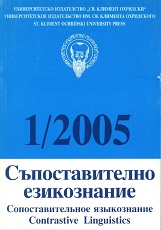The Grammatical Strategies of the Bulgarian Perfect and its Modal Meanings
The Grammatical Strategies of the Bulgarian Perfect and its Modal Meanings
Author(s): Francesca FiciSubject(s): Language studies, Language and Literature Studies, Theoretical Linguistics, Semantics, South Slavic Languages
Published by: Софийски университет »Св. Климент Охридски«
Keywords: Bulgarian; perfect; modal meanings; grammar;
Summary/Abstract: Using a corpus of dialogues from literary texts in Standard Bulgarian, I attempt to demonstrate that the wide range of meanings associated with the forms of perfect (inferential, evidential, experience among them) corresponds to a grammatical grid, where the lexical verb and its arguments are placed in specific slots. In other words, the Bulgarian perfect is considered as a complex grammatical category, incorporating not only the verbal form, but also several positions reflecting the speaker’s attitude and the pragmatic roles expressed in the sentence. This approach is made unique by the types of components, which determine the structure of the sentence as a whole. Among them are modal and interrogative adverbs, conjunctions introduced by quoting verbs and 1st / 2nd or 3rd person auxiliaries. The first section of this article deals with the actual state of the perfect in the area, from a diachronic and a synchronic perspective. Section 2 focuses on the presentation of data and the definition of a semantic map of the perfect in modem Bulgarian. Section 3 consists of an attempt to interpret the data discussed previously according to a theoretical framework. Conclusions are provided in section 4.
Journal: Съпоставително езикознание / Сопоставительное языкознание
- Issue Year: 2005
- Issue No: 1
- Page Range: 32-47
- Page Count: 16
- Language: English

